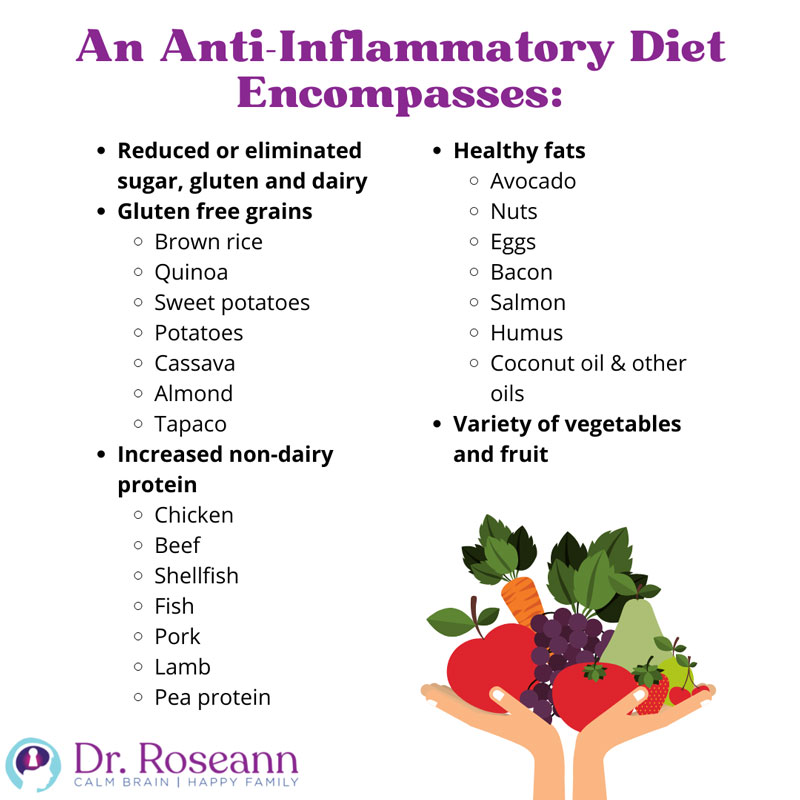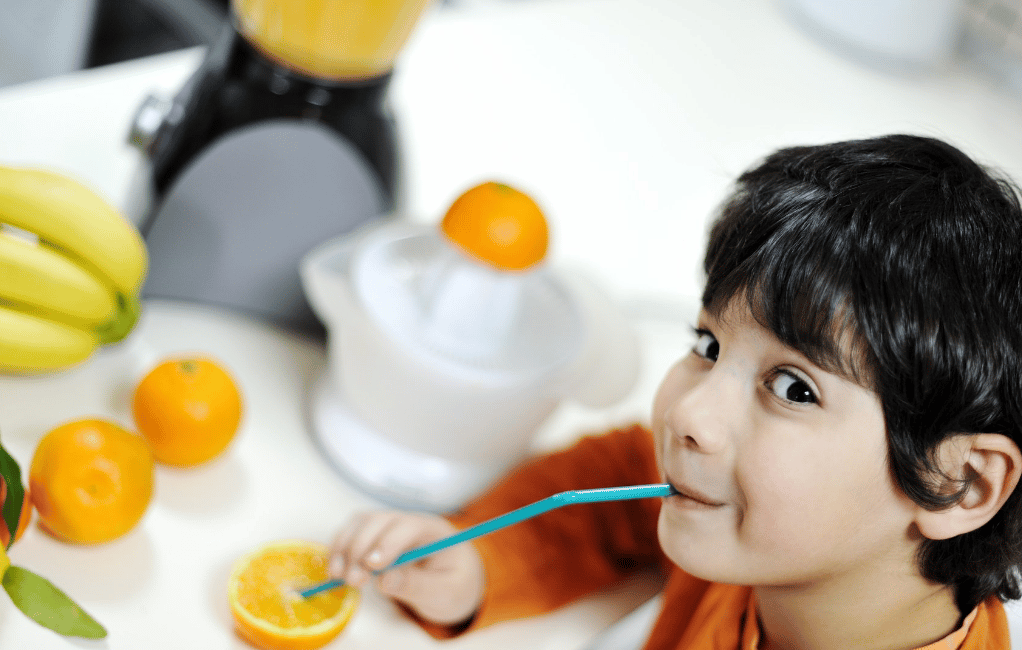One of the top questions I get from parents of kids with PANDAS and PANS and those with Lyme Disease is, “What should my kid with PANDAS and PANS eat?” As much as I want to scream from the rooftop, “An anti inflammatory diet!,” it isn’t as simple as that.
Kids with pediatric autoimmune neuropsychiatric disorders have complex medical and psychological needs that make getting the best, most nutrient dense food in them hard.
A high rate of obsessive compulsive disorder (OCD), sensory processing issues, and eating disorders such as anorexia nervosa and ARFID in those with PANDAS/PANS lead to eating restrictions that make achieving proper nutrition extremely difficult. Of course, without proper nutrition, the brain and body can’t heal from the infections and toxins that come along with PANS and PANDAS.
How Nutrition Helps PANS and PANDAS
Nutrition helps many mental health and behavioral conditions. Navigating nutrition with PANS, PANDAS and AE is a challenge that must be done carefully.
Nutrition Improves the Microbiome
Diet is a known driver of the microbiome and eating a variety of nutrient dense foods helps to build a healthy gut. A healthy diet promotes microbiota in the gut, which stimulate the immune system, break down toxic food compounds, and synthesize certain vitamins and amino acids that the brain and nervous system need.
Just as a healthy microbiome has many health benefits, an unhealthy microbiome, or dysbiosis, is associated with increased health conditions. Research (Morita, 2015) shows us that gut dysbiosis has been found in a higher rate of those with anorexia, which is a common condition in PANS and PANDAS.
Nutrition Increases Cognitive Function
Studies show that a Mediterranean Diet and other anti-inflammatory diets that are high in antioxidants, omega-3 fatty acids and B vitamins, have been shown to improve brain functioning. Logically, what you eat impacts your attention, memory, and processing and the more nutrient dense food you eat, the better your brain functions.
Nutrition Improves Mental and Behavioral Health
Reducing inflammation through an anti-inflammatory diet, especially a Mediterranean diet, has been shown to decrease anxiety and depression. Proper nutrition and stable blood sugar counters behavioral and mood dysregulation and reduces the effect of stress on the brain.
A diet rich in fruits, vegetables, whole grains, nuts and oily fish, all of which have anti-inflammatory properties, have been shown to influence concentrations of brain chemicals that regulate emotions and cognition.
Studies have shown that those with more severe mental health issues eat more pro-inflammatory foods.
Nutrition Affects Neurotransmitter Function
It may be surprising to learn that one’s diet can affect neurotransmitter function in a world where every commercial seems to be pushing a pill for this or that. Diet can affect multiple brain processes by regulating neurotransmitter pathways, synaptic transmission, membrane fluidity, and signal-transduction pathways.
Nutrition Reduces Inflammation
Eating foods rich in polyphenols has been found to reduce inflammation and reducing inflammation should be a part of all PANS/PANDAS treatment plans. Polyphenols are a category of compounds that are in plant foods, such as fruits, vegetables, herbs, spices, tea, and dark chocolate.
Polyphenols exert their neuroprotective actions by protecting neurons against injury induced by neurotoxins, an ability to suppress neuroinflammation, and the potential to promote memory, learning, and cognitive function.
Strategies to Help Kids With PANS and PANDAS Get More Nutrition
First, you have to calm the brain. No behavioral change is possible when a brain is in a stress activated or inflammatory state. The frontal lobes are designed to shut down so you can react to a “predator” without thinking. The problem with kids with pediatric acute onset neuropsychiatric syndrome, their brain is in a constant state of fight, flight or freeze. That is why calming the brain has to be the first priority.
In our BrainBehaviorReset™ Program, we use PEMF and neurofeedback for PANS and PANDAS to calm the brain so we can address behaviors such as compulsions, tics, rage, anxiety and other PANS and PANDAS symptoms.
Neurofeedback is also used to treat mental health disorders such as obsessive compulsive disorder, anxiety, depression, and tic disorder: all of which are common with streptococcal infections, tick borne illness, and other infections and toxins. Once the nervous system is calmed then behaviors can be addressed with specific types of therapies such as, exposure and response prevention therapy for OCD, cognitive behavioral therapy, family therapy, somatic therapy, etc.
Next, address the behaviors. Your PANS/PANDAS/AE treatment plan should always address infections and toxins, inflammation, calming the brain and of course the behaviors. Once the brain is calm enough, your child can pay attention, process information, and take action. They can learn when they couldn’t absorb what you or even a therapist was trying to teach them before.
For example, when one has OCD symptoms, when a child isn’t so activated, then the OCD obsessions, compulsions, and rituals can be addressed. When you try to address the fears that drive their avoidant behavior without calming the brain, it leads to frustration for both the child and parent. The fear that drives OCD makes a child irrational and without the right tools that a family learns through ERP therapy, it is a long uphill battle with no end in sight. With the right tools, kids can learn how to talk back to OCD.
For those with an eating disorder or OCD-related food restrictions and PANS or PANDAS, those underlying issues, along with treating infections and addressing inflammation must be prioritized. Making sure you run lab work to look at infections and nutrient deficiencies is an important part of the treatment plan.
Trying to force a child to “eat” when they have an eating disorder or an obsession or compulsion related to eating or food, will only worsen a very stressful situation. This is where working with a PANS/PANDAS specialist such as myself and my team will give you the guidance you need. There are many holistic remedies for PANS, PANDAS and AE that can help with healing.
An Anti-Inflammatory Diet Encompasses:
- Reduced or eliminated sugar, gluten, and dairy
- Gluten free grains (Brown rice, quinoa, sweet potatoes, potato, cassava, almond, tapaco, etc.)
- Increased non-dairy protein (Chicken, beef, shellfish, fish, pork, lamb, pea protein, etc.)
- Healthy fats (avocado, nuts, eggs, bacon, salmon, humus, coconut oil, other oils)
- Variety of vegetables and fruits

Consistent protein and fat throughout the day helps stabilize blood sugar, which is important in mood and behavioral regulation. Often non-dairy protein shakes are the place to start to increase protein and nutrition while stabilizing blood sugar.
Citations:
Firth, J., Veronese, N., Cotter, J., Shivappa, N., Hebert, J. R., Ee, C., Smith, L., Stubbs, B., Jackson, S. E., & Sarris, J. (2019). What Is the Role of Dietary Inflammation in Severe Mental Illness? A Review of Observational and Experimental Findings. Frontiers in psychiatry, 10, 350. Frontiers
Johnson, A. J., Zheng, J. J., Kang, J. W., Saboe, A., Knights, D., & Zivkovic, A. M. (2020). A Guide to Diet-Microbiome Study Design. Frontiers in nutrition, 7, 79. Frontiers
Lassale, C., Batty, G. D., Baghdadli, A., Jacka, F., Sánchez-Villegas, A., Kivimäki, M., & Akbaraly, T. (2019). Healthy dietary indices and risk of depressive outcomes: a systematic review and meta-analysis of observational studies. Molecular psychiatry, 24(7), 965–986. Springer Nature Limited
Meeusen, R. (2014). Exercise, Nutrition and the Brain. Sports Med 44, 47–56. Springer Nature Switzerland
Morita, C., Tsuji, H., Hata, T., Gondo, M., Takakura, S., Kawai, K., Yoshihara, K., Ogata, K., Nomoto, K., Miyazaki, K., & Sudo, N. (2015). Gut Dysbiosis in Patients with Anorexia Nervosa. PloS one, 10(12), e0145274. PLOS ONE
Parletta, N., Milte, C. M., & Meyer, B. J. (2013). Nutritional modulation of cognitive function and mental health. The Journal of nutritional biochemistry, 24(5), 725–743. Science Direct
Quagliariello, A., Del Chierico, F., Russo, A., Reddel, S., Conte, G., Lopetuso, L. R., Ianiro, G., Dallapiccola, B., Cardona, F., Gasbarrini, A., & Putignani, L. (2018). Gut Microbiota Profiling and Gut-Brain Crosstalk in Children Affected by Pediatric Acute-Onset Neuropsychiatric Syndrome and Pediatric Autoimmune Neuropsychiatric Disorders Associated With Streptococcal Infections. Frontiers in microbiology, 9, 675. Frontiers
Always remember… “Calm Brain, Happy Family™”
Are you looking for SOLUTIONS for your struggling child or teen?
Dr. Roseann and her team are all about solutions, so you are in the right place!
There are 3 ways to work with Dr. Roseann:
You can get her books for parents and professionals, including: It’s Gonna Be OK™: Proven Ways to Improve Your Child’s Mental Health, Teletherapy Toolkit™ and Brain Under Attack: A Resource For Parents and Caregivers of Children With PANS, PANDAS, and Autoimmune Encephalopathy.
If you are a business or organization that needs proactive guidance to support employee mental health or an organization looking for a brand representative, check out Dr. Roseann’s media page and professional speaking page to see how we can work together.
Dr. Roseann is a Children’s Mental Health Expert and Licensed Therapist who has been featured in/on hundreds of media outlets including The Mel Robbins Show, CBS, NBC, PIX11 NYC, Today, FORBES, CNN, The New York Times, The Washington Post, Business Insider, Women’s Day, Healthline, CNET, Parade Magazine and PARENTS. FORBES called her, “A thought leader in children’s mental health.”

She coined the terms, “Re-entry panic syndrome” and “eco-anxiety” and is a frequent contributor to media on mental health.
Dr. Roseann Capanna-Hodge has three decades of experience in working with children, teens and their families with attention-deficit hyperactivity disorder (ADHD), autism, concussion, dyslexia and learning disability, anxiety, Obsessive Compulsive Disorder (OCD), depression and mood disorder, Lyme Disease, and PANS/PANDAS using science-backed natural mental health solutions such as supplements, magnesium, nutrition, QEEG Brain maps, neurofeedback, PEMF, psychotherapy and other non-medication approaches.
She is the author of three bestselling books, It’s Gonna Be OK!: Proven Ways to Improve Your Child's Mental Health, The Teletherapy Toolkit, and Brain Under Attack. Dr. Roseann is known for offering a message of hope through science-endorsed methods that promote a calm brain.
Her trademarked BrainBehaviorResetⓇ Program and It’s Gonna be OK!Ⓡ Podcast has been a cornerstone for thousands of parents facing mental health, behavioral or neurodevelopmental challenges.
She is the founder and director of The Global Institute of Children’s Mental Health, Neurotastic™Brain Formulas and Dr. Roseann Capanna-Hodge, LLC. Dr. Roseann is a Board Certified Neurofeedback (BCN) Practitioner, a Board Member of the Northeast Region Biofeedback Society (NRBS), Certified Integrative Mental Health Professional (CIMHP) and an Amen Clinic Certified Brain Health Coach. She is also a member of The International Lyme Disease and Associated Disease Society (ILADS), The American Psychological Association (APA), Anxiety and Depression Association of America (ADAA) National Association of School Psychologists (NASP), International OCD Foundation (IOCDF).
© Roseann-Capanna-Hodge, LLC 2023
Disclaimer: This article is not intended to give health advice and it is recommended to consult with a physician before beginning any new wellness regime. *The effectiveness of diagnosis and treatment vary by patient and condition. Dr. Roseann Capanna-Hodge, LLC does not guarantee certain results.













